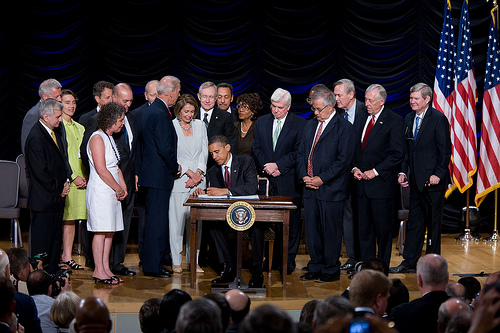
Perhaps the last thing Democrats want to do, after all the hard work of getting Dodd-Frank through Congress, is to consider including financial services in upcoming trade talks with Europe. But it might be the best way to preserve the effectiveness of financial reforms.
For some members of Congress, the mere thought of discussing anything that could be construed as financial regulation in the context of trade liberalization smacks of a possible end-run around a long fought and much-needed upgrade of our financial system, especially in a world after AIG and Lehman Brothers. So understandably, some skeptics are already pushing to carve it out completely from the Transatlantic Trade and Investment Partnership (or TTIP) talks recently announced by President Obama and set to begin in July.
But this thinking is wrong. Far from running from TTIP, Congressional members concerned with systemic risk should embrace it. Dodd-Frank is already under attack–and not just from the usual suspects like special interests, but also from globalization itself. Because of the international nature of today’s financial markets, many of the objectives embraced in Dodd-Frank–from trading OTC derivatives on exchanges and centralized clearing to hiving off or limiting the activities of too-big-to-fail banks–require international cooperation to actually be effective. Without it, the United States can certainly try to unilaterally regulate the world. But chances are, go-it-alone strategies will just force still dangerous transactions offshore, or push some of our closest trading partners to retaliate against us, or just as damaging, ignore the US government when it asks for help pursuing its own objectives abroad.
Enter the TTIP. Make no mistake, the TTIP is a trade agreement, and as such is aimed at removing trade impediments like tariffs and subsidies that distort commerce. But importantly, it also includes measures aimed at promoting “regulatory coherence” in ways that reduce duplication and inconsistencies in US and EU regulatory approaches.
When applied to financial services, some instinctively assume that this means watering down US regulations for multinational banks or for pesky Europeans who have little interest in abiding with the US’s tough financial standards. However, besides the fact that the USA is not infrequently the weaker link in financial regulation, regulatory coherence doesn’t have to spell out any specific rules per se. Instead, it can also create a framework for solving problems cooperatively and overcoming gaps that can undermine the efficiency and safety of the global financial system. And it’s especially this possibility that Democrats should embrace.
Up to this point in time, regulatory statecraft has been animated by informal, non-binding international agreements promoted by organizations like the Financial Stability Board and the Basel Committee. Agencies like the SEC, or the Federal Reserve, negotiate standards or rules abroad with foreign counterparts, and then implement them at home through administrative processes.
This has been done with good reason. Treaties are cumbersome and ill-suited to responding to markets that can change in a matter of not days, or hours, but picoseconds. Plus getting “hard law” agreements off the ground was and continues to be highly impractical. But treaties can still play an important role in providing a framework for coordinated action. And it is here where TTIP–and formal treaties–can play a role.
Informal organizations aren’t always effective vehicles for juggling headstrong superpowers with varying political or regulatory priorities. And where there are lapses and gaps, there can be real coordination conundrums. In the EU, for example, top policymakers might be fighting what they suspect are efforts by banks to stifle derivatives trading on exchanges, while US authorities might be bent on tackling how much margin should be posted in swap transactions. And then they might still accuse each other of being “too soft.”
With this in mind, it’s not too hard to imagine how a thoughtful TTIP could promote coordination in ways both Democrats and Republicans could embrace:
- It could work towards synching financial rulemaking processes of US independent agencies, on the one hand, and EU organs like the European Commission on the other;
- It could create a reasonable timeline for negotiating varying issue areas; and require regulators to identify periodically stumbling blocks to cooperation;
- It could spell out broad standards and perhaps even metrics (consistent with existing international best practices) for establishing cooperative arrangements like mutual recognition regimes;
- It could commit to providing EU and US regulatory agencies with the financial resources to conduct thorough assessments of one another’s strengths, weaknesses and divergences in order to push the coordination process along.
I want to be clear here. In my opinion, a game-changing TTIP need not require any substantive agreement on any specific regulatory terms. But it would push the coordination process along and set out a clear framework and agenda to concluding a process that is losing steam. In sum, what I’m proposing is indeed a truly 21st century agreement that moves the ball forward on a defining issue of the transatlantic relationship, and which if properly executed could allow the two regulatory superpowers to export not only goods, but also high quality financial standards and approaches to not only one another, but to the rest of the world as well.
Chris Brummer is the C. Boyden Gray fellow on global finance and growth, as well as project director, Transatlantic Finance Initiative. This piece first appeared in The Huffington Post.
Photo credit: Leader Nancy Pelosi
Image: 4816864266_77fd79667c.jpg
